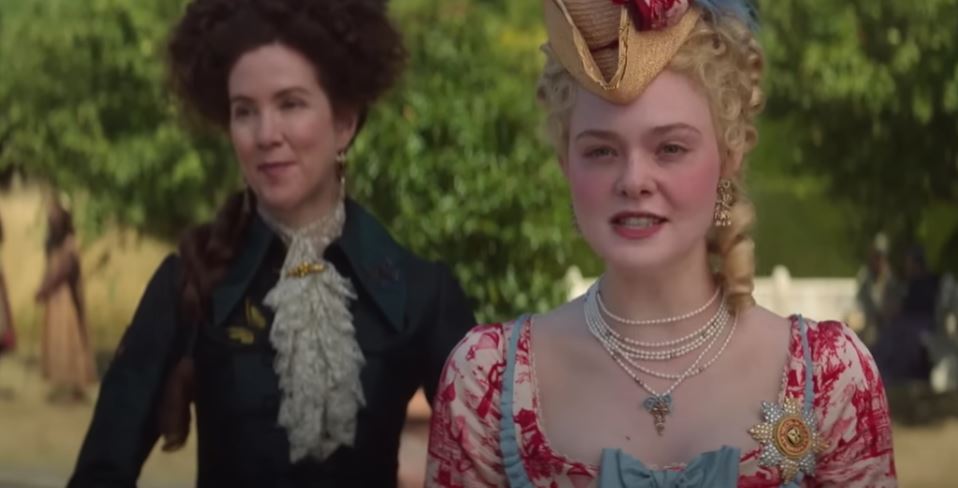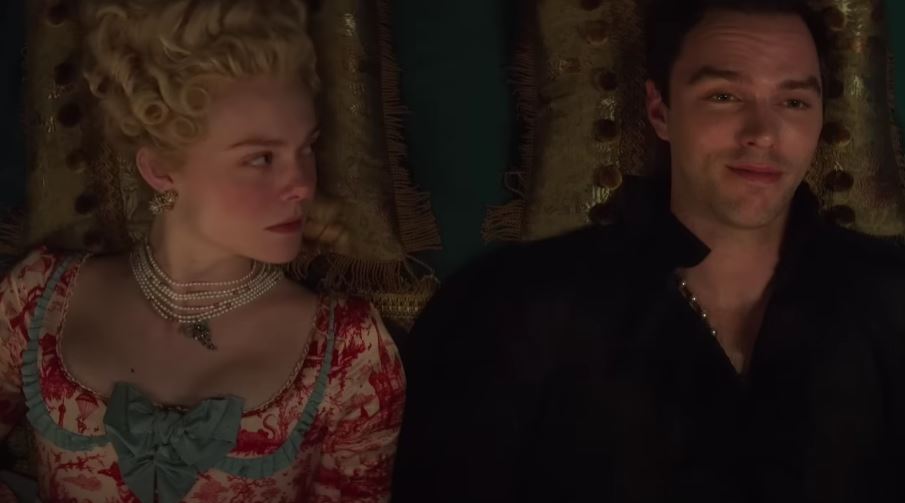Like most fictional stories, The Great draws viewers in with a clear concept of who its characters are and where their destination will go. Catherine the Great will go from a naive girl new to Russia and become its undisputed ruler. Certain people will have to be forcibly removed from her path. Add in a sprinkle or two of comedic modernization about the rights of women in 1800s Russia that she has to carve through before and during her time as empress, and you have the concept of The Great.
Only season 3 didn’t make this clearly defined arc quite so simple. Catherine’s newfound romance with Peter, as well as her insecurities as a ruler, somewhat flipped the story on its head. Numerous times throughout the season, I was left infuriated by the choices she made, and thinking that Catherine had never been so unlikable. This is a dangerous game to play, and one I can imagine fans of The Great having divisive opinions over.

Nonlinear character arcs, and the controversy they create, are certainly nothing new. Sometimes they make for some of the most memorable moments of the stories we love, such as Zuko’s decision to side with Azula at the end of Book 2 of Avatar: The Last Airbender. These moments where characters suddenly backslide, repeating flaws or decisions they were seemingly growing away from, create raw emotions that hit the story’s audience particularly hard. They also make the endpoint, where the character does fulfill the promise of their arc, even more rewarding. Those moments of triumph feel earned in a way they would not have if the character traveled steadily down their set path, with no real obstacles or struggles.
The flip side of this, of course, is the chance that a story stalls a character in a way that isn’t actually compelling. A fan of The Last Airbender could easily see Zuko’s move as wasting time, and at the time I’m sure they did. The raw feelings created by his decision make it easy to take your frustration out on the story. A fan of The Great may walk away from season 3 unsatisfied with watching Catherine abandon so much of the passion and dedication she had towards her goals for Russia.
Instead, we had to watch Peter, Elizabeth, and others corrupt Catherine’s reign, taking advantage of the optimism and great capacity for love in her heart to alienate her from everything she wanted and everyone who had helped her reach the throne.
The Great was distinctly aware of how audiences would feel while watching this, and used Catherine’s supporters to voice what they would think as we watched each episode. Orlo was probably the most obvious representative of the audience, as his endless anger and frustration over Peter’s continued survival boiled over into outright trying to kill the man. There was also Katya, who transformed from a loyal supporter to a playwright cruelly mocking Catherine as a vapid, useless tool with no ability to achieve anything she wanted.
Moments and characters like them make a difference between stalling a character arc for lack of ideas compared to carefully considered character relapses.
Catherine’s arc in season 3 is very much a well-seeded relapse. Fans have known since The Great’s first episode that Catherine is a romantic soul whose drive to change Russia was driven by the shocking absence of love she felt for Peter. That’s why her motivation to plan the coup wavered the second Leo entered the picture. He filled the absence of love Catherine felt in her soul, and so suddenly taking Russia didn’t seem so important anymore.
Season 2’s surprising romance between Catherine and Peter was very strange to watch, but it followed the same principle idea. Catherine was pregnant with his child, he gave her some good sex, and Peter showed just enough potential for change that the romantic in Catherine allowed her to fall in love. By the time Peter’s whole…ordeal with Catherine’s mother happened, and she found out, it was too late to go back. She was in love, and The Great has made it very clear that once Catherine loves, she does not stop easily.
Season 3 is frustrating because she just won’t stop. Even with everything Peter did, every moment that hurt and undermined Catherine, she kept loving him. It was infuriating. Nothing he did would wake her up to how broken and hurtful the relationship was to them both.
What’s worse is how this fed into the insecurities that kept Catherine from committing to the path she wants to take. Every time something proved harder than she imagined, she let the naysayers of the old ways, namely Peter, Elizabeth, and Archie, talk her into retreating, into letting the old ways win. She hastily backed away from giving the peasants more say in government, and did the same with her attempts to legalize divorce.
It works, though. This all works because The Great is simply following through on the characters they created. I never felt like my time was being wasted by Catherine’s sudden backslide into the worst of her habit of retreating when reality proved more difficult than her idyllic dreams. Perhaps I would say otherwise if season 3 ended with no progress being made, but what we get instead is a Catherine who lost a bit of that person she used to be and moved forward as someone new, for better or worse.
Peter’s death took a piece of Catherine with him, and until he died, her arc had to stall in place. Their relationship was a tug of war, much like the literal one we see in their marriage counseling, and someone had to fall and lose. We knew it would be Catherine, and so Peter needed to go for The Great to move forward again.

Look, I love Nicholas Hoult and his portrayal as Peter. I couldn’t imagine that he would leave the show this early. Maybe my enjoyment of the terribly unhealthy relationship between him and Catherine was because of how endlessly entertaining Peter always proved to be.
The problem was that he embodied the old Russia that Catherine wants to evolve away from, and any honest telling of this story would have to remove him from said story before Catherine could move on.
I can see the argument that Catherine’s grieving period after Peter’s death was a bit too extreme and lasted a bit too long. Peter’s death occurs halfway through the season, and Catherine spends practically the rest of the season in a mournful haze while everyone else runs Russia for her, and it feels every bit as long as it sounds to type that out. She doesn’t snap out of her grief until the last fifteen minutes or so of the final episode, when the assassin comes for her during her morning ritual of Russian Roulette.
(Speaking of things that went a bit too far, Catherine’s morning ritual was definitely a bit much to see over and over.)
I can appreciate the intent behind this prolonged period of misery, though, if for no other reason than it provided a meaty acting challenge for Elle Fanning, who has to play a Catherine who was sometimes a totally different person from episode to episode.
We already knew that Catherine mourns hard, and Peter’s death was just one part of a string of loss that pushed Catherine to this point. I think this is an important aspect to remember; Catherine never really dealt Leo’s death, or her mother’s. She threw herself into her coup after Leo, and suppressed Leo’s death to the point of slapping herself anytime she wanted to cry. She clings closer to Peter in season 3 for seemingly the same reason, since it allows her to ignore the loss of her mother. Losing Peter, on top of alienating her closest allies, left her truly alone, with nothing to really latch on to. The coup was over, her family and friends are gone, and she is left alone, with no choice but to either deny reality entirely or finally let it all hit her.
And when it hits, hoo boy does it hit.
If nothing else, Catherine’s decision to clean house at the end of the season feels so much more earned for the struggles The Great puts her through. Rather than an inevitable, by the numbers stroll through the plot points laid out when her story started, Catherine had to fight. She had to truly overcome temptations and bad habits established throughout her journey. The Great has never been shy about making this journey harder than Catherine expected it to be, and season 3 was simply the toughest stretch of the journey so far.
Now she is heading into the unknown, towards true character progress (with a new Bisexual Bob haircut), without the vast majority of her previous support group or the obstacles holding her back. Almost the entirety of the old regime she fought to overthrow are now gone. For all the struggle to get there, Catherine ends season 3 having accomplished the very thing she wanted to back in The Great’s very first episode. This is truly Catherine’s Russia now, to shape how she sees fit.
I’m sure she will continue to face these moments of doubt, where she reaches too far and too fast for an idea that receives intense, dangerous backlash. She would not be the same character if she suddenly lacked that kind of naive optimism that defines her. I hope, though, that she will be firmer in her resolve now. I think she will be, even if this could make her dreams all the more dangerous.
That can be the struggle with handling nonlinear character arcs, though. Many times, shows find it easy to keep repeating the same patterns over and over simply because fans like it. The Great would have been totally justified in keeping Peter alive forever so they could repeat the excellent dynamic between Elle Fanning and Nicholas Hoult for as long as Hulu pays them to do so. I wouldn’t have complained. It’s not like real life has character arcs. We all know someone who has been the same person their entire life, and stubbornly refuses to learn from their mistakes.
I’m glad The Great is a more ambitious show than that. We’ll see where season 4 takes Catherine and the cast around her. After all, Catherine is far from the only one who fell back into bad habits after seemingly growing beyond them. Marial continues to return to Archie’s side, no matter how little he deserves it or how badly it hurts her friendship with Catherine. Archie continued to devolve back into the perverted habits of his pre-Church life. Peter struggled mightily to actually let Catherine be Empress. Velementov betrayed Catherine to continue trying to fight a war in Sweden and fell back hard into drunkenness.
This is a show about Catherine, though, and it is her character arc that takes precedent. However others may struggle, you have to believe that Catherine will continue towards whatever endpoint The Great has in mind for her.
But if they want to take more pit stops like Season 3, I won’t complain.
Images Courtesy of Hulu
Have strong thoughts about this piece you need to share? Or maybe there’s something else on your mind you’re wanting to talk about with fellow Fandomentals? Head on over to our Community server to join in the conversation!

